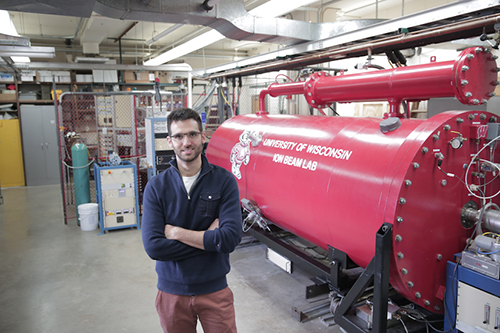THURSDAY, DECEMBER 15, 2016
A team of researchers spanning two continents is at work on a nanoceramic coating that not only stands up to the effects of radiation but actually becomes stronger as well.
The collaboration between the University of Wisconsin-Madison (UW) and the Istituto Italiano di Tecnologia (IIT) in Milan resulted in a new coating material that is expected to make the next generation of nuclear reactors safer and more economical, the UW College of Engineering announced.
The research was recently published in the Nature journal Scientific Reports.
Addressing Heat, Corrosion
Although the newest advanced nuclear systems are expected to produce more energy more efficiently and economically, they will be operating at higher temperatures and radiation fields, the university noted.

 |
| University of Wisconsin-Madison |
|
An international team of researchers has created a nanoceramic material they say not only withstands the harsh effects of radiation, but also becomes tougher under radiation. |
The traditional reactor coolant, water, reportedly does not pose a great corrosion risk to the materials that make up a nuclear reactor—but water-cooled reactors come with a limit to the maximum temperatures at which they can operate.
Meanwhile, newer coolants, such as liquid metals like sodium and lead, remain effective at higher temperatures but are more corrosive to the reactor, UW explained.
"There is a preferred use of metallic materials for structural components, but many of these materials cannot withstand high-temperature corrosion in advanced reactors," said Kumar Sridharan, a distinguished research professor in engineering physics and materials science and engineering at UW.
"Corrosion is a surface phenomenon, so if you put coating on the surface, you need that coating to withstand high radiation doses without becoming embrittled," he added.
Coating That Toughens
Sridharan and his partners at IIT responded with the creation of a new aluminum oxide nanoceramic coating that reportedly holds up against the effects of high-temperature liquid metals in next-generation reactors.
While many materials are known to harden and crack under radiation exposure, these aluminum oxide nanoceramic coatings are said to become tougher instead—meaning they actually benefit from the exposure, according to Fabio Di Fonzo, a team leader at the IIT Center for Nano Science and Technology.
"The pinpoint of our work is the demonstration that an amorphous or nanoceramic material can improve during irradiation, and this opens the path toward a different view of nuclear materials, specifically where coatings are concerned," he explained.
Through microscopic analysis, the team was reportedly able to get a greater understanding of the coatings properties, connecting changes they saw in the mechanical properties with changes in the nanoscale structure, said Alexander Mairov. Mairov and Francisco García Ferré initially worked with Di Fonzo while pursuing their master's degrees at CNST-IIT.
García Ferré calls their discovery a "paradigm shift in the field,” because until now, no material has been shown to actually exploit radiation.
"With this new material, we benefit from a radiation environment to tailor the evolution of the mechanical properties of the material,” he said. “In particular, we are able to have a material that, by the end of its lifetime, has similar mechanical properties as when it was first exposed to radiation."
Tagged categories: Coating chemistry; Coating Materials; Coatings; Coatings Technology; Colleges and Universities; Corrosion; Corrosion control coatings; Corrosion protection; Nuclear Power Plants; Research and development